Professor Brian Cox Explains How Danny Boyle’s Sunshine Inspired One Episode Of BBC Earth’s Universe
The British physicist was the science consultant on the 2007 sci-fi thriller that starred Cillian Murphy and Michelle Yeoh. That’s why.
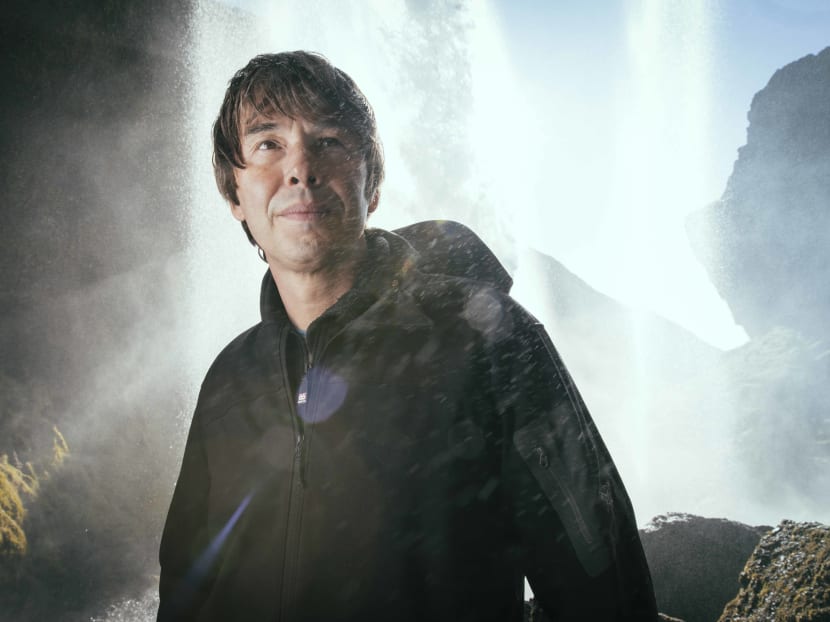
The British physicist was the science consultant on the 2007 sci-fi thriller that starred Cillian Murphy and Michelle Yeoh. That’s why.
When Hollywood needs an expert to explain the wonders of science to the masses, they reach out to Neil deGrasse Tyson or Bill Nye. In the UK, the go-to science guy is David Attenborough. It’s either him or Brian Cox. No, not that Brian Cox, the actor in the HBO series Succession, but Brian Cox, the Professor of Particle Physics in the School of Physics and Astronomy at the University of Manchester and regular presenter for BBC Earth’s science documentaries.
Before he became Brian Cox the preeminent physicist, he was Brian Cox the keyboardist with D:Ream, a dance/rock combo which scored a No. 1 hit with 1993’s ‘Things Can Only Get Better’. “The music thing was always a temporary one [and] I’ve always wanted to be an astronomer,” Prof. Cox told 8 DAYS back in 2006 when he was in town to promote his then new show Forces of Nature. He never regretted leaving music behind. “Understanding how the universe works is more interesting,” he said.
And there’s still a lot to learn about how the universe works and it’s his responsibility to spread its gospel both within and outside academia. “Science is too important not to become [part of ] popular culture,” he said then. “[Students today] have many things like sports, music, and movies competing for their time. I think science should compete in that space as well. [For that to happen,] it has to exist in popular culture. Otherwise, if it doesn’t get the attention, you get fewer people pursuing science and less progress [for humanity].”
Flash forward to the present: Prof. Cox is back to anchor another BBC docu-series, Universe. Shot on awe-inspiring locations and featuring immersive special effects, this five-parter takes the viewer on a spectacular interstellar journey to examines the gazillion stars, suns and galaxies that make up the vastness of space. (By the way, I highly recommend that you watch the show with headphones: Like Prof. Tyson, Prof Cox has a cool, calming voice that can trigger ASMR vibes. (I don’t remember my science teachers sounding like that. If they did, I would’ve probably pursued a career in science, who knows?)
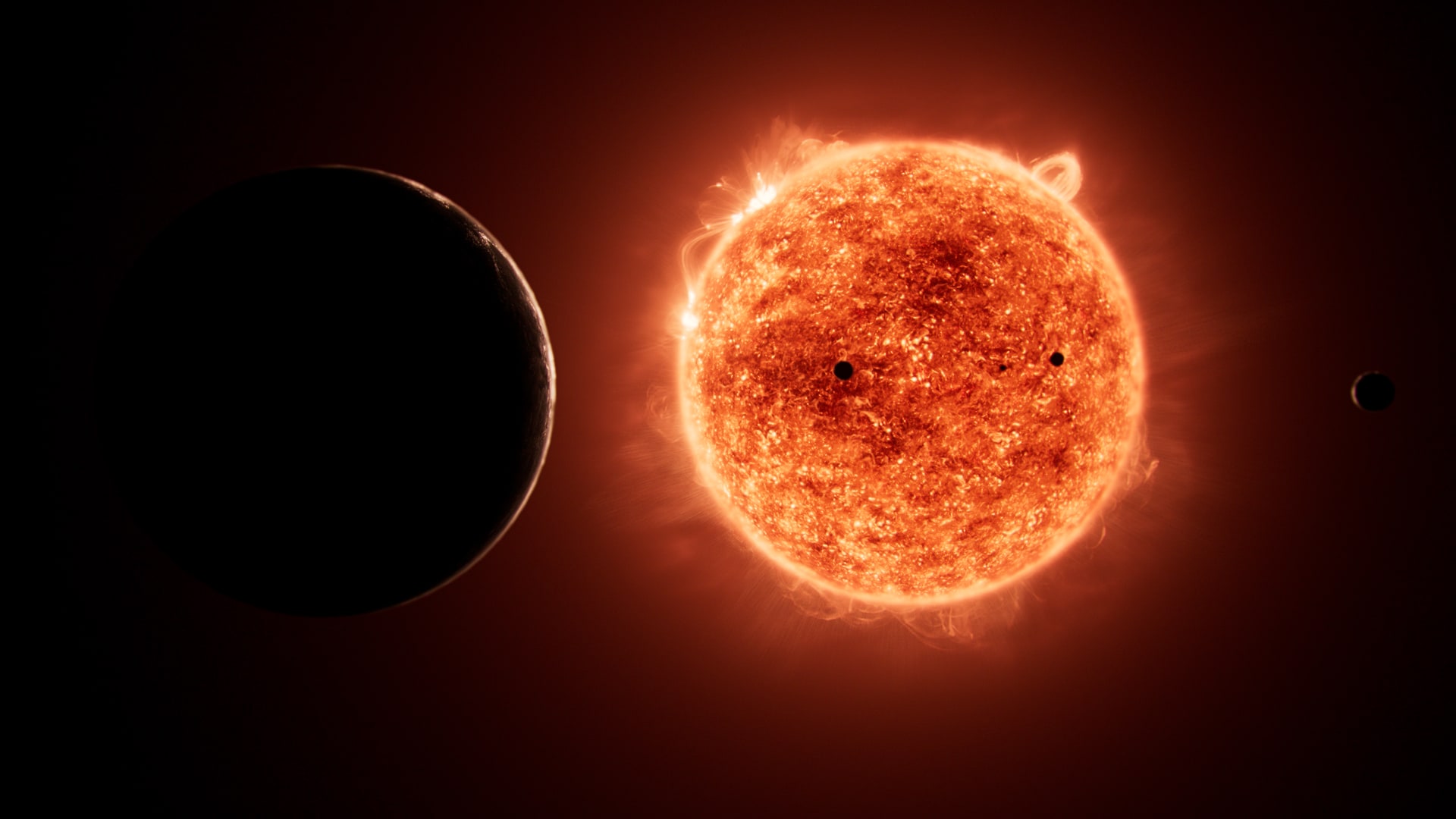
Staring at the sun: The Parker Solar Probe approaches the Sun. It's the first time we are 'touching' the sun.
PROF. BRIAN COX: In this series, we wanted to not only describe the current science. In other episodes, we go all the way to black holes, which I think are the most interesting things in the universe; [we also look at] something called inflationary cosmology, which is where we're talking about a universe before the Big Bang and how that behaved, and so we go right to the edge of knowledge.
But it's also a series about what that knowledge means, and I think that's tremendously important because in some sense it's very easy to say, well, there are two trillion galaxies in the observable universe. Or, we know that stars live and die, and one day there will be a last star and there will come a time in the universe when the stars no longer shine. Those are discoveries that we've made.
But it surely occurs to anyone, even to scientists who are watching: what does it mean? What does it mean that there will come a time when there are no stars, and essentially no life in the universe? What does the story of the stars mean? And so, in every episode, we also explore the deeper sense of how we might react to those discoveries, and obviously, it's my reaction to the discoveries.
Everyone will have a view about how they feel about the fact that the universe is not eternal, in the sense that there will come a time when it's very different and there are no stars lit in the sky. And so, I think for me, that's what documentaries should do. I think it shouldn't just deliver a load of numbers and a load of discoveries; a list of what we've discovered about the universe. Television is a form of entertainment and there's more than just the facts there. There's a sense in which we could explore our emotional reactions to them.
After watching ‘God Star: The Sun’, the first thing it reminded me of is Sunshine, the Danny Boyle movie about a mission to jumpstart a dying Sun with a colossal stellar bomb.
scientific advisor, but I also worked with the actors. In particular with Cillian Murphy [who played a physicist] and also Chris Evans, Michelle Yeoh, and Rose Byrne. It’s a film in the spirit of this series, actually. It’s interesting that you picked it up. The actual opening sequence of the ‘Star God’ episode is deliberately a very direct reference, to Sunshine. And I did that deliberately because Sunshine treats a star as a god in a very real sense.
And as I say in Universe, they are, to some extent, fitting with our definition of what a god is like. The stars are the creators of us, of everything that’s complex in the universe. Because stars create the chemical elements beyond hydrogen and helium. Carbon, oxygen, iron — all the things that are necessary for a complex universe are created in stars. Also, stars are, in old-fashioned language, the steam engines of the universe. You need hot spots in a cold sky in order for anything to develop in order for life to exist. And that’s what stars do. So that’s what Sunshine did — they deified it. So that was an inspiration for the ‘Star God’ episode.
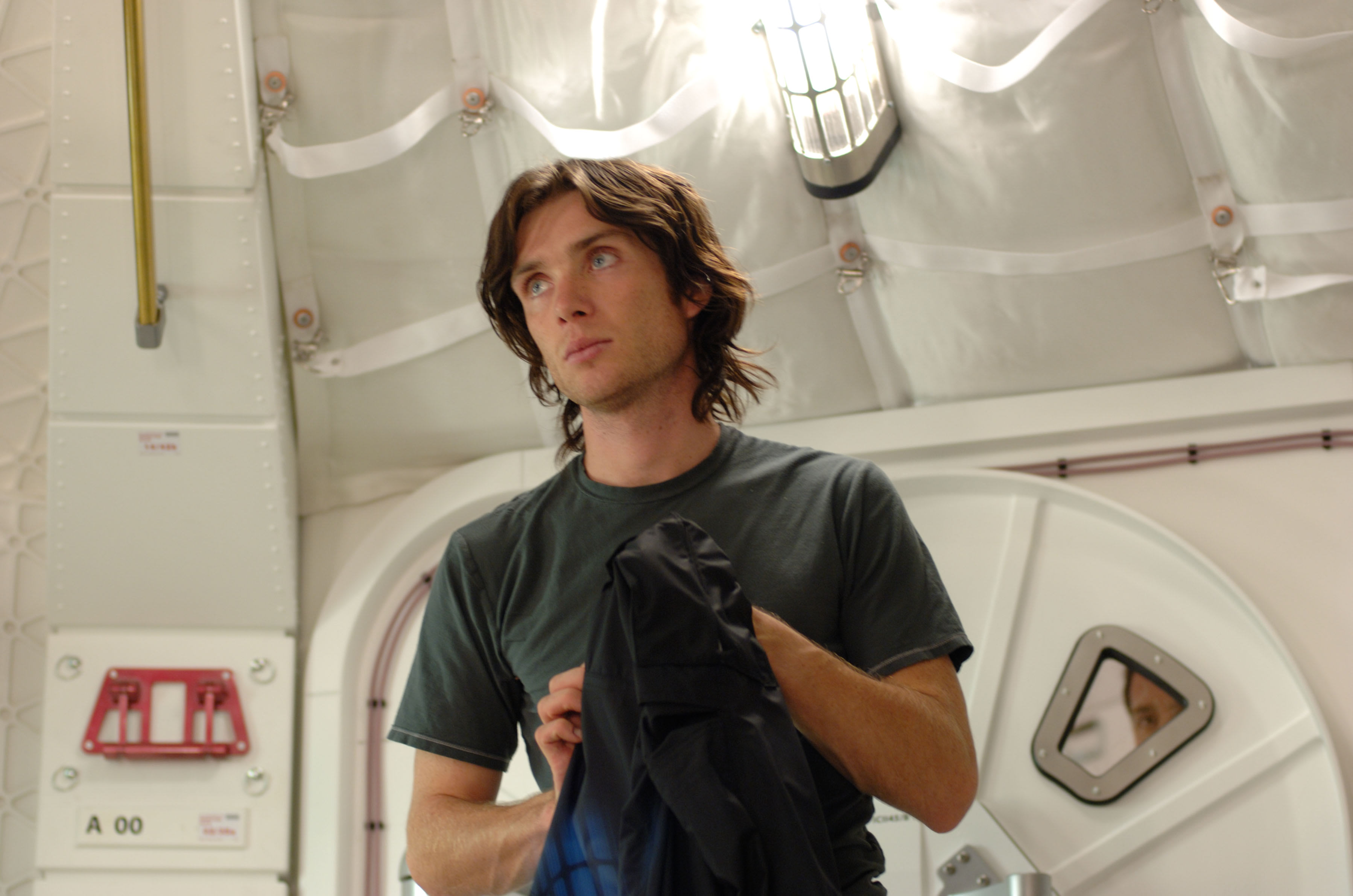
A man on the mission: Professor Brian Cox was the scientific advisor on 'Sunshine'. Cillian Murphy's character, physicist Robert Capa, is said to be based on Cox. I loved working on that film, Cox tells 8days.sg. Alex Garland, who wrote it, is a great writer.
There’s a line in that episode where you said we don’t have to invent imaginary gods to explain the universe. Do you think that science and religion can coexist?
Science certainly doesn’t rule out the existence of any gods, or god. We don’t know how the universe began. We don’t even know if it had a beginning. I think the ability to say we don’t know lies at the heart of science. That’s what science is. And one of my great heroes, [American physicist] Richard Feynman, called science “a satisfactory philosophy of ignorance”, which is that in order to make progress in understanding something, you have to accept that you don’t know.
So, I’m absolutely, perfectly comfortable with saying I don’t know the answer to that question. But in the sense in which I meant that — the context of that speech that I delivered on a mountain about halfway through the episode — is that stars have many of the characteristics that we have ascribed to gods. But they are real objects that we know to exist, that shine in the sky. Not only the sun, but the billions of stars; hundreds of billions in the Milky Way, and the trillions of stars in the galaxy beyond. And what’s interesting about them is that, as the episode discusses, they have a lifetime.
So, I found it an interesting idea that we have these god-like objects by some definition, the creators of everything we hold dear including ourselves, but they are mortal. They have a life. And that’s what the episode is about. So that’s what that monologue means to me. It’s meant to say that although the universe itself, as far as we can tell, may exist forever, it will not have structures in it forever. So in a sense, you could say the universe has a lifetime. Everything has a lifetime and I thought that was an interesting idea.
After watching Universe, I went back to watch Cosmos, the one with Professor Tyson. I’ve always wondered that if there’s so many science documentaries about our planet and the universe, why are there still flat earthers, science deniers and, amid the COVID-19 pandemic, anti-vaxxers? Maybe we need to make more science documentaries to educate them…
Carl Sagan [the host of the original Cosmos: A Personal Voyage] was one of my heroes and I grew up with that series. I still think it’s the best science documentary series ever made. What’s interesting is that Sagan was very concerned back in the late ’70s, early ’80s. Specifically, he was talking about America, and he was concerned in general about the fact that once we lose the concept of shared facts in our civilisation, it’s very hard to get them back.
We’re really talking about a medieval, or pre-medieval world, a world of superstition. He wrote a book called The Demon-Haunted World. Science is a candle in the dark, warning us that if we begin to exist in a society where people can even challenge the idea that we live on a spherical planet, then we run the risk of sliding back into a demon-haunted world. A world where we’re afraid of the dark.
The medieval or pre-medieval world really, surely, is not a place that we want to live. I’m sure we want to live in a world where we have modern medicine, where we have access to the internet, where we have long life expectancy, where we can travel the world, and indeed, where we’re beginning to take our first steps out into the universe. That’s the world we want to live in.
But we can’t live in that world if we’re building a society where members of that society — not necessarily of their own fault, by the way; it’s a problem with education — don’t accept certain basic shared facts about the world, about nature, and about how we make intellectual progress. We can’t generate new knowledge if we don't have a shared view of what reliable knowledge actually is.
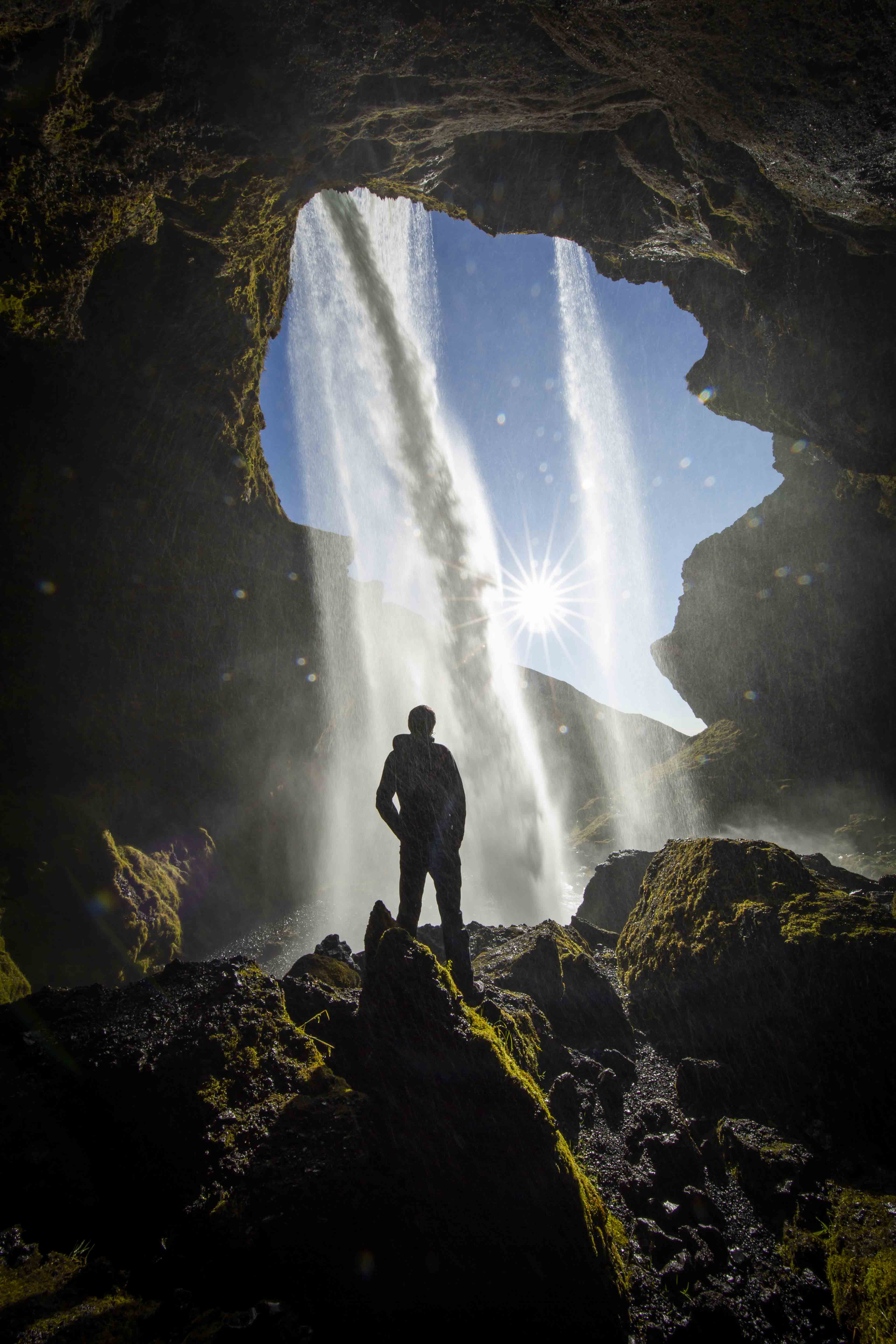
Out of this world (but on Earth): Prof. Brian Cox stands behind the Kvernufoss Waterfall in Iceland, as seen in the first episode, 'God Star: The Sun'.
I don’t want to live in a demon-haunted world!
And ultimately, the responsibility lies with us — me, the scientists, the media, the education system in general. I think Sagan was right to be worried. I think it’s worse now than when Sagan was worried about it in the 1980s and ’90s, and partly maybe because of the Internet, who knows?
But I think we need to take it seriously. So you’re right in that documentary has a role to play. Ultimately, I don’t think that’s going to solve the problem (laughs). It’s a very deep problem, and the Universe documentary goes to the heart of this. It’s not impossible for civilisations to fall. They do. We had the ancient Egyptian civilisation. It’s still there in a sense, but it’s changed dramatically.
Greece, Rome, these great empires that we think of in the past all fell, and there’s no reason why the 21st-century civilisation that we’ve built shouldn’t fall also. And I think that the way to protect it is to find a way of respecting the knowledge that we have. A key part of the series, a key message, is that by standing on the edge of the known, understanding what that means, understanding what we know and don’t know, we can stand with delight and not fear. That’s what research is. By doing that, we give ourselves a better chance of long-term survival. So I think science documentaries are important. I should also say that that’s a fundamental part of the series: What does it mean that our lives in the universe will be finite? What do these discoveries mean? I think that should be the province of a science documentary.
You went to some epic, awe-inspiring locations on Universe. When did you shoot this series?
That’s 2019, 2020. We usually choose locations really very carefully to fit with the message, so we think about them quite deeply. But you’re right, we usually have the canvas of the earth to play with. In this case, we really went where we could because we just went anywhere that would let us in, basically because we filmed all the way through the pandemic (laughs). We filmed, as we often do a lot, in Iceland. Iceland really lends itself to films about cosmology, because it’s such a striking landscape. We also filmed in Dubai, a little bit in the desert, and in the Azores [in Portugal], which was a really beautiful place to film. And a lot in the UK; we don’t often film a huge amount in the UK.
The episode about galaxies is filmed entirely on Skye, a little island off the coast of Scotland, and it was really beautiful because it gave the episode a presence, a character. It grounded it because we didn’t hop all over the world. We stayed on an island, and it gave us an idea because the story is about galaxies, but also predominantly about the Milky Way.
And in some sense, the Milky Way is an island. It’s an island of 200 billion suns, but on human time scales, it’s isolated from the rest of the universe. It floats like an island in the void. But actually, over longer time scales, the story of the evolution of galaxies is a story of interactions between the islands. So the islands do bump into each other, and merge and influence each other over a very long time scale. Billions of years. And so, the island itself, the Isle of Skye, became a character in the film and I don’t think we’d have gotten that had we been able to do our usual thing of choosing landscapes and locations all over the world.
You were last in Singapore in 2019 for the Universe World Tour. According to your website, you’re headed here for another concert, this time called Horizons: A 21st Century Space Odyssey. Can we expect from you this time?
I love visiting Singapore. I’ve been there almost every year for about 10 or 15 years, and I’ve really missed it in the pandemic. So, I can’t wait to come back. The new live shows reflect on many of these issues we’ve talked about, actually. I start the show by posing a question — what does it mean to live in a finite, fragile life in an infinite, eternal universe? Which is a big question. And I talk about black holes, the origin of space and time, and the origin of life.
And there’s also music in the show because I think if we’re really going to address the question of what these discoveries mean, we have to use the whole intellectual armoury available to us as humans. So that’s literature, music, philosophy and theology, and just all of human culture.
So, in some sense, the show is a celebration of our civilisation and our achievements. It goes back to what we said — I believe that human civilisation is the most remarkable naturally-occurring structure in the universe that we know of. It’s clear. It’s not even a belief, right? It’s true. Human civilisation is the most remarkable thing, and so I felt that a live show that celebrates that as well as the scientific discoveries is a great thing to do.
And also, one of the things I did was I made the intro film to the concerts — I basically remade 2001 in about eight minutes, to a piece of music called ‘Sibelius’ Symphony No. 5, the Third Movement’. So that’s the opening to the show. It’s a big, cinematic opening. I spent all the money that my promoter thinks they will generate on the entire tour. I just remade 2001 with all the money so people have to come and see it, otherwise, my promoter is going to go bankrupt (laughs)!
I’m not sure when we’re going to be there. (Pauses for a while) I’m looking now… I just got an e-mail, actually, saying hopefully we’ll be there in October next year. We weren’t quite sure when the show was going to be because of COVID, but it’s going to be in 2022. As far as I can, I guarantee I’ll be in Singapore then.
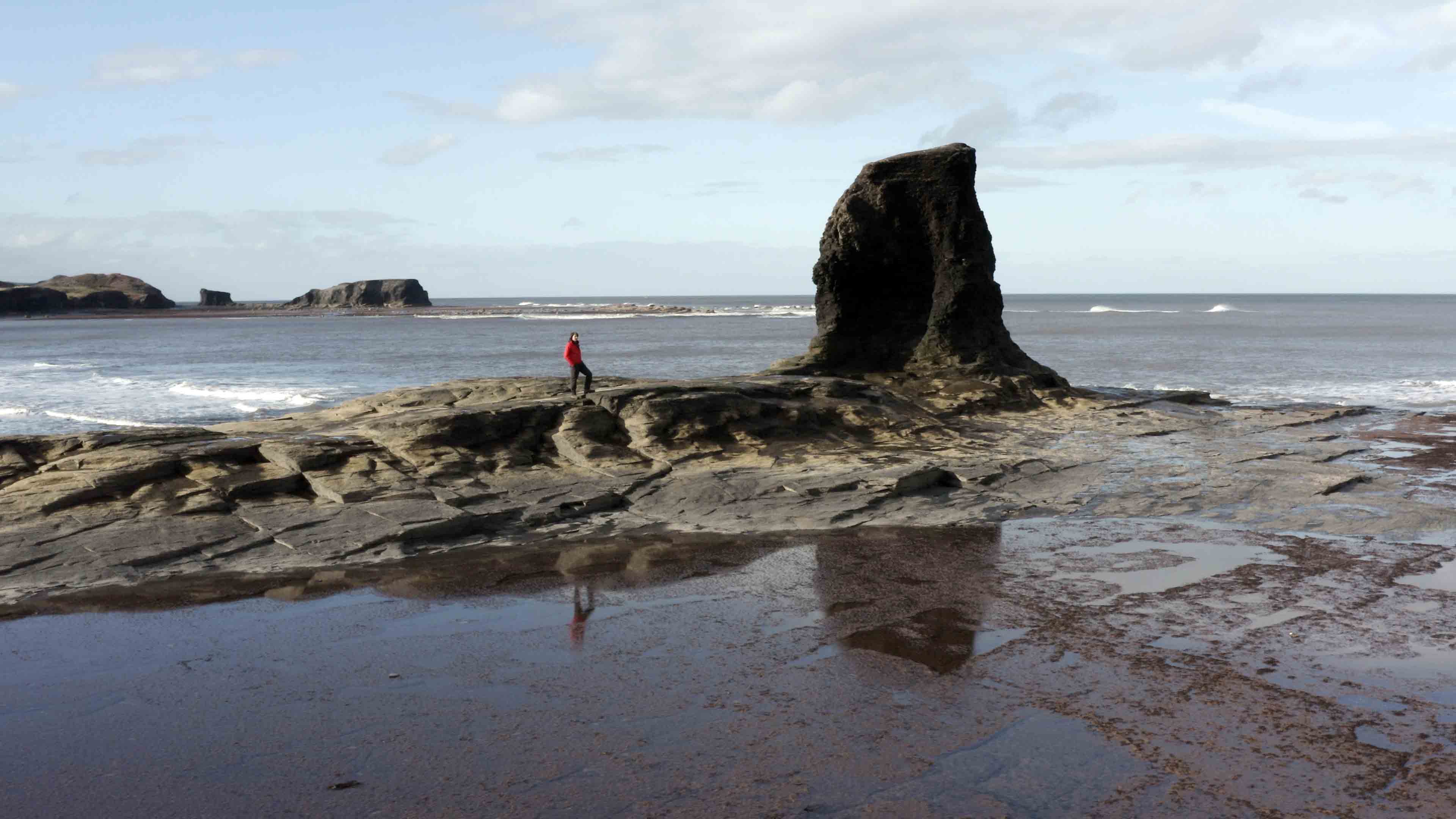
Instagrammable moment: Prof. Cox basks in the sun along the coast ofSaltwick Sea, Yorkshire. As seen in the episode 'Black Holes: Heart of Darkness'.
Universe premieres Dec 5 on BBC Earth on Singtel TV Ch 203, StarHub Ch 407 & BBC Player), 9pm. Sunshine is now available on Disney+.
Photos: BBC Earth, TPG News/Click Photos.









